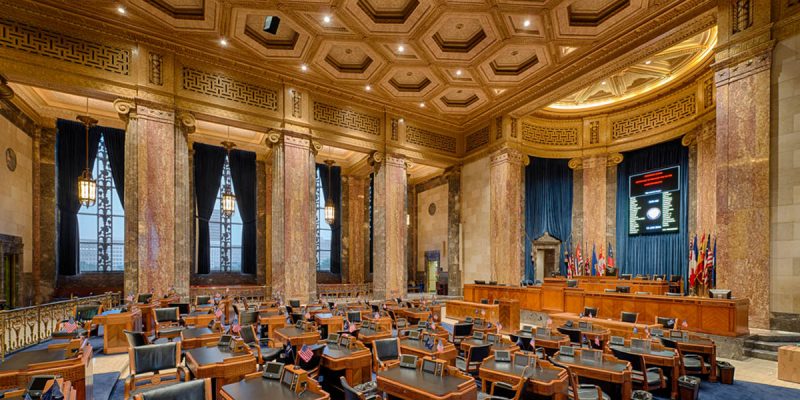A few months ago, a special session was called by the governor to raise new taxes that would have replaced expiring taxes. It ended without resolution. This week, the regular session begins to show signs of wrapping up to leave ample time for a second special session to try it all over again.
The new fiscal year begins July 1st, and for the second year in a row, there are more questions than answers at this point on what will be taxed, funded, cut and reformed in this year’s budget. The five special sessions over the last two years focused on taxes and spending have come and gone, with many of the same options as the only ones on the table.
There is a large coalition supporting legislation to call for a constitutional convention to help bring sanity to this process. It would create a framework to put people across Louisiana in charge of reviewing our constitution, recommending changes and sending that document straight to the people for an up or down vote. It died this week on the floor of the House of Representatives, yet another victory for those who benefit most from the top-heavy governing system we have had since the 1920’s. The main argument against a constitutional convention is that it is just too risky.
Too risky? How can it be riskier than what we have done in Louisiana for generations?
Many of the challenges and proposed “solutions” faced by Louisiana have been around for as long as any of us can remember. Check some of the old editorials from your local paper and reports from the Public Affairs Research Council (PAR), and you will see that many substantive debates of the past are the same ones taking place today.
In Louisiana, it seems the players change from time to time, but the game remains the same.
Once again, we’re faced with a budget locked up by dedications and obligatory spending, restricting our ability to use current dollars for priorities like education and health care. However, bills attempting to undedicate many of these funds and make existing dollars open to annual oversight get gutted and killed every year.
We know our legal climate is one of the worst in the country. In fact, the U.S. Chamber of Commerce Institute for Legal Reform ranked it 51st in the country this year (even behind the District of Columbia). Experts repeatedly note our legal climate contributes to high insurance rates and discourages certain industries from investing here. However, legislation to reform our legal system is mischaracterized and shelved each year.
Very few people in this state like our tax code. The collection of sales taxes is complicated, and many exemptions and credits have been applied over the years to gloss over the negative economic impact of an uncompetitive tax code. Louisiana’s system forces taxpayers to send most of their hard-earned dollars to the same Capitol that has struggled to balance its books for decades rather than keep more of these dollars locally, like Southern peers such as Texas, Florida and Tennessee. Those states do not have an income tax but somehow have more stable economies, better infrastructure and higher achievement from educational systems. It seems a new approach more dependent on local control and less dependent on state subsidies is at least worth considering.
Advertisement
Louisiana’s government pension plans are in obvious need of modernization. They are just not working for today’s workforce, and they are proving costly for taxpayers. One of the pension systems even took the lead in suggesting a new hybrid approach this year, one to provide security for employees and a modern plan for new workers that better met their needs. It was a good compromise backed by a diverse coalition. It died in the Senate after the governor came out against it.
There are repeated examples of worthwhile reforms being killed this session quietly. Ridesharing has become a national phenomenon, changing the way people travel in their communities. Legislation was offered to create a statewide network for companies like Uber and Lyft to expand in Louisiana; it was halted in the Senate. Another bill to create an online database, known as the “LouisianaCheckbook.com,” that would easily show government spending at all levels is also stuck in a Senate Committee.
Louisiana’s problems are complex, as are the solutions we must consider. Holistically reforming our state’s governing system is not an option, it is an absolute necessity. Anyone who disagrees with this statement is simply not paying attention or is trying to maintain a status quo that works for the chosen few at the expense of the many.
Much has been written about the spending and tax debates that dominate our attention, but the sheer number of policy reforms killed this year is probably a better example of just how broken the state Capitol really is.
The annual death of legislation to unlock dedicated funds, simplify the tax code, and reform entitlement programs is no longer a surprise. Unfortunately, you can now add the killing of sensible bills to make government spending more transparent, government pensions more sustainable, insurance more affordable, ridesharing more available and small business licensing more attainable to that list of failed legislation.
While there are plenty of good people trying their best in government, the facts are clear. Louisiana’s system of government is woefully outdated and needs to be changed. We think a constitutional convention is the best way to get there. For those who don’t, it’s time for them to put their big plan on the table… because the absence of a specific plan is an endorsement of what we have today.
Advertisement
Advertisement

